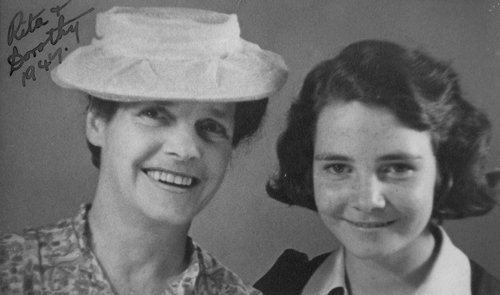Chapter 11 ARTARMON 1946
On the second occasion that Mum was in hospital my cousin Betty, who was a physiotherapist at Royal North Shore hospital, happened to be walking through Mum's ward one day. The conversation went along these lines:-
"Auntie Rita, what are you doing here?"
"Oh, I've had a heart attack but I'm on the mend now."
"Are you living near here? We haven't seen you since Margaret's wedding. Who's looking after Dorothy?"
"We have a room at Cammeray. Dorothy is managing with the help of the good Lord."
When Auntie Dorrie and Uncle Perce heard this piece of news they were momentarily speechless. Although they were righteous people, they were no longer so certain about the grace of the good Lord. And they had no time for my father, who they thought had walked out on his responsibilities to us especially in selling the house over our heads, at a time before Mum was eligible for any sort of pension.
"Why on earth didn't she let us know? She knows we are on the phone. Or get Dorothy to ring, or at least write."
They were around in their car to our place that evening, after calling at the hospital to get the address and tell Mum they would look after me at least until she was discharged. They were quite dismayed at the small, dingy room they saw and removed me hastily. I put my few clothes in the case, collected my school things and left without regret.
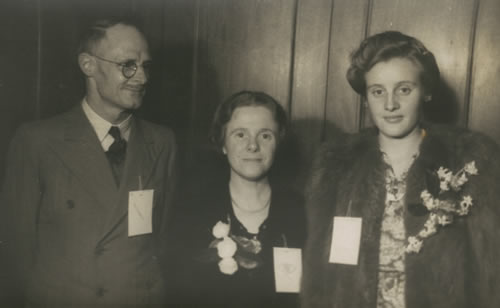
Uncle Percy, Aunty Dorrie and Betty
Their house at Artarmon was not large, but it certainly was comfortable and in a quiet area. It was named "Juniper" because Uncle Perce had proposed to his young English sweetheart during WWI by a juniper tree. They could not get her parents' consent and so had eloped to Scotland to marry and later sailed for Australia. At first, life had been very hard but twenty-five years later, they had everything they really wanted. The floors of their home were carpeted, they had hot water in the tiled bathroom for weekly baths, an indoor flush toilet, elegant furniture, a washing-machine, a food mixer as well as a vacuum cleaner - unheard of luxuries in my world and in many homes of the time.
Auntie Dorrie had a piano and a record-player and a wireless in the living-room. She liked to listen to "The Lawsons" on the ABC during the program "The Country Hour" , which Uncle Perce considered pointless as a story. There was a black bakelite telephone. Betty and Uncle Perce each had a camera, a good one.
My mother thought when they had left Ramsgate ten years before, that they were rather materialistic and that the atmosphere in their home was worldly. I thought I had found Paradise. The next day after a beautiful dinner with desert and no Grace, we went into the living-room to relax. Auntie Dorrie had been a vivacious redhead in her youth and had learnt to sing and play the piano in her home in Devon. "Get out your mandolin dear," she said to Betty as she selected some music. She disliked unmelodious music which she called "sausage music".
Betty was in her early twenties, nine years my senior, tall and fair. She had had a private school education, before going to university to study physiotherapy. She kept the rhythm of the songs on the mandolin, while we all sang or hummed and Auntie Dorrie competently played the melodies - excerpts from Gilbert and Sullivan, "Devon Glorious Devon", "The Cornish Floral Dance" "Kashmiri Love Song", also "The Road to Mandalay" and other songs made popular by an Australian baritone, Peter Dawson.
"I have some urgent work to do," said Uncle Perce presently.
"Can't it wait for one night?"
"No. I have some proof-reading to do for the printer this week. How would you like to earn some pocket-money?" he said to me.
"Yes," I agreed readily.
"I've been through these once, but I still miss a few mistakes. I'll give you threepence for every one you find."
He wrote books which he published under the name of Oxford University Press, aids to learning for high school students and also ran a private coaching college. It puzzled me to think of this quiet unassuming man as an MC winner in the mud of France during WWI as my mother had told me. On his return to Australia as an ex-serviceman with a young wife, he had decided to matriculate and then get a degree and Diploma of Education. This was not easy as he had left school at the age of twelve, partly because he had exhausted the possibilities of the one-roomed school at Jerilderie and largely for economic reasons. His lack of formal education was one of the reasons that Auntie Dorrie's English parents did not approve of him as a prospective son-in-law, although he had the nebulous idea of studying at Oxford University.
At nine o'clock he packed up his books and paid me the shilling I had earned.
"You must have some regular pocket-money while you are with us dear", said Auntie Dorrie. "And you need some new clothes. I wash once a week and you haven't enough. You need a spare of everything, one in the wash and one to wear and enough underwear to change every day. I'll get some supper now while you choose a record to play."
I chose "The Nutcracker Suite" from their pile of records as something I recognised and this had become the symbol of my musical awakening. Betty showed me how the electric record-played worked. It did not need to be wound.
Uncle Perce talked about bunyips (probably bitterns) which he had heard as a boy when working on his grandfather's farm in Victoria. He had written a fantasy story about bunyips called "A Night in Cavernland" for Betty as a girl. Betty took a copy from the bookshelves and another book she thought I would like "Daddy Long Legs" by Jean Webster, about an orphan girl given the chance of an education by an anonymous benefactor. In coming days I enjoyed both stories and illustrations.
Auntie Dorrie soon came in with cocoa and home-made biscuits.
"Time for bed now my dear," she said. "Wash your face and clean your teeth."
They all kissed me goodnight. This was new to me. Kisses had not been a regular part of our daily family life.
I went to bed on the closed in back veranda with tunes spinning in my head. I was waltzing on a cloud. They called me "dear". Pocket money! Spare clothes! My future must be brighter than the past few years.
Auntie Dorrie took over doing Mum's washing and bought her extra nighties. They bought me more underwear and two pairs of summer pyjamas and a handbag. We found in time that the "black" wartime stockings lost their pigment down our legs in wet weather and in the wash, disclosing that they were in fact dark green, blue or grey which continually faded with each wash. Clothing coupons as well as the necessary cash were needed.
Mum was persuaded that she could not go back to Cammeray as her health was not good and I was too young to be responsible. No doubt the landlady agreed. The rest of our belongings were collected. Our names went on a list for emergency accommodation from the recently set-up Housing Commission.
Auntie Dorrie insisted I use the phone from time to time to get me accustomed to a new experience. At first I had to talk to someone she had rung, then I had to make a call myself and finally ring her when I was out to let her know when I would be home. I had only ever made an infrequent call from a public phone and knew how to ring to get the correct time. Public phones were common but often out-of-order and sometimes I lost my money without making the connection. If the number was engaged, it had to be redialled until the call was successful. Auntie Dorrie insisted I carry two pennies wherever I went "in case". This was no problem as I was used to having at least one in case I needed to "spend a penny" as most public toilets were operated by a coin in a slot.
I also had to use my best table manners, and found out about butter knives and other niceties, although they didn't insist on them every day, and were quite happy for grilled chops to be "picked" to get off the last morsels.
In a letter to my friends at Colo Heights I described the beautiful steeply-terraced garden which I said my uncle kept very neatly. Giving the letter to my aunt and uncle to read resulted firstly in being assured that my uncle did NOT do the gardening and secondly that I could have a small plot and plants which I proceeded to neglect.
Betty went soon after on a skiing holiday to Kosciusko. We rang her at the Chalet (personal call) for her birthday on 19th August and sang "Happy Birthday" and I was inspired to save my pocket-money towards a similar goal. For the first time in my life it seemed possible to plan and execute an idea that involved a large sum of money. Our school motto was "Each man is the maker of his own fortune" but that seemed rather far-fetched. My savings began to grow very slowly, hampered effectively by the temptation to spend most of my income on sweets.
My visits to the hospital were regular, my conversation matter-of-fact.
"How are you getting on at school? How do you like French?"
"All right I suppose."
"What do you like best?"
"I don't know."
"I used to like French, but I didn't do well at mathematics. Are you still doing well with algebra?"
"Mm."
I didn't think my mother's experiences of over thirty years before as being of any relevance. Gradually my problems were taken more frequently to my aunt than to my mother. I developed an enormous admiration for my uncle and a teenage hero-worship of my grown-up cousin. I postponed thoughts of the inevitable change.
My time there was very busy. When my homework was done I could draw, paint, read or write. They had plenty of materials for these activities and bought extra if I wanted. They bought me a book, similar to those I had used at Erskineville for my projects, but of best quality, one page lined, one blank for charcoal drawings. I called my first effort "The Stars in their Courses, the story of a starry night" and did charcoal drawings on the blank pages, which were sprayed so that they would not smudge. I was intrigued with space and the the way people in the past had drawn the conclusion from observation that the earth was not the centre of the universe and scientists today could calculate the orbits of celestial bodies. The result was sent to the Argonauts Club and earned me a Blue Certificate. I got another Certificate for a poem "Seeking". There was scope to be creative in fiction or poetry and use my imagination. Uncle Perce said that Epaminondas (my Argonaut name) had originally been the name of a Theban hero under whom they won a victory over the Spartans of Ancient Greece. Auntie Dorrie told me it was the name of a negro boy in a children's story who invariably misinterpreted his Mammy's instructions. His auntie gave him some butter which he carried close to his body and it melted before he got it home. "Epaminondas," his Mammy said "you ain't got the sense you was born wiz."
All contributions to the Argonauts earned points towards the final goal of the Golden Fleece, as achieved by Jason and his band of Argonauts.
We went to visit Uncle Vern and Aunt Mary who lived in a grand two-storey house at Wollstonecraft called "Trentagh" after her home in Ireland. The adults played cards. I entertained myself with exploring the vast house and reading their books. Aunt Mary had also been a war-bride in WWI, had only one child, a son who was now a doctor in New Guinea. They had risen in the world as Uncle Vern studied accountancy and conveyancing and improved himself. Like my mother he had been born in Jerilderie whereas Uncle Perce and the older children were born in Victoria where their Irish ancestors had settled.
I had taught myself to pick out melodies on my grandmother's piano and any others that I came across. Auntie Dorrie found me a music teacher and wanted me to have regular lessons which she would pay for. I had been named after her and I felt that she treated me as someone special.
My mother agreed, although she was concerned that I was becoming too worldly in my outlook. "Seek ye first the kingdom of God," she reminded me, but I had serious doubts. Even my interest in space made her uncertain as planets and other solar bodies were not mentioned in the Bible, which of course was written before the concept of the solar system had arisen. We had learnt something about geology and evolution in history and geography classes at school. Auntie Dorrie thought we are born with a natural curiosity and a feeling for song and dance and I agreed it could not be wrong to develop these gifts or other talents and to enjoy the products of man's ingenuity. After some misgiving, my mother was persuaded to let me learn the piano.
My aunt and uncle were not now regular churchgoers but were clearly people of strong Christian (Protestant) principles and beliefs.
I saw that there was a bewildering array of beliefs which people held, mostly following those of their parents, sometimes they changed if a different church became more convenient or more charismatic. But there was a clear similarity, they were basically the same, the differences being minor interpretations.
In her leisure time Betty enjoyed amateur dramatics, photography, carpentry, golf and tennis. She was a good driver, Auntie Dorrie said much better than Uncle Perce. She had been a tomboy as a youngster and enjoyed "boyish" games such as cricket and activities such as carpentry. She gave me her old tennis racquet and her dressing gown in which I danced around, pretending it was a ball gown. Auntie Dorrie encouraged me not to be inhibited about going around the house not completely dressed. I took her at her word and overdid the half-dressed idea in my pre-pubescence. This was soon to change. My mother was discharged from hospital and discouraged the habit. And I soon stepped into the adolescent world and Auntie Dorrie found cloths for me to wear with a sanitary belt, and other cloths for me to use to have an APC wash (armpits and crutch) while menstruating.
Mum, too, fitted into the little house, physically if not emotionally. We had Betty's room. I had a stretcher bed which went under Mum's bed during the day. Betty slept on the veranda. The design of the house on a sloping block did not allow for any extension even if building materials had been available.
Mum did not vote, as Jehovah's Witnesses argued that the government was not godly. Auntie Dorrie said "If their children were lost they would expect help to find them, and if they accept government help with hospitals and education, then they should have an opinion about how it should be done and how it is paid for."
Auntie Dorrie could be very outspoken and less generous than Mum about Dad as well as everything else. There was some oblique discussion about politics. Having come from a country governed from London, Auntie Dorrie thought that state governments for a much smaller population were quite unnecessary.
Mum believed people must be here for a purpose and believed she knew what the purpose was. Auntie Dorrie didn't see that the purpose was what Mum had accepted. Everyone created their own meaning.
"God helps those who help themselves", was unspoken.
It was obvious that they developed a tacit agreement to avoid conflict by avoiding provocative topics.
When Mum was not well, their family doctor made a house call. Betty was still working at the hospital at the time and one day, found her mother and mine were there at the foot of the stairs and were required to go up. Mum was considered an "ambulatory patient", which included climbing stairs so Betty took them up in the lift which was permitted for staff but not for patients. Mum was readmitted for a period.
Betty explained to me some of what she knew of Mum's condition. I learnt that receptors sense the diminished blood volume in the arteries from the heart, hormones trigger increase in salt and water retention, then greater volume in the veins puts further strain on the heart which has to pump harder to pump the same amount of blood (from a prehistoric need to retain salt and water in times of danger). During a heart attack, heart tissue dies as it is starved of oxygen. Patients become short of breath and their tissues swell up due to water retention. The only treatment at that time was digitalis for the heart and recently developed sulfa drugs for pneumonia.
At times Auntie Dorrie's widowed father and brother came for meals. Before WWII Uncle Perce, who had finally been forgiven for taking their young daughter to the Antipodes, had paid their fares to come to Australia to escape another war.
Sometimes on Sunday we joined the queues of "Sunday drivers" on the road to Bobbin Head, Coal and Candle Creek, Berowra Waters or Galston Gorge for a picnic with a basket of treats cooked by Auntie Dorrie and thermoses of hot water for tea and milk for me.
Some weekends as summer approached we went to their holiday cottage, "Blue Waters" at Avalon. It was a simple one bed-roomed house which they had built from a kit. It was surrounded by bush and there was a smell of gum trees and salt water. Any number of visitors could be accommodated on the long veranda, sleeping on stretchers under mosquito nets in the summer. Auntie Dorrie loved company. Uncle Perce did oil paintings as a hobby including one of trees at "Blue Waters". In the evening we sometimes played games such as "consequences".... Boy met girl at... He said... She said... And the consequences were... After each entry the paper was folded over and passed on so the story came out quite garbled.
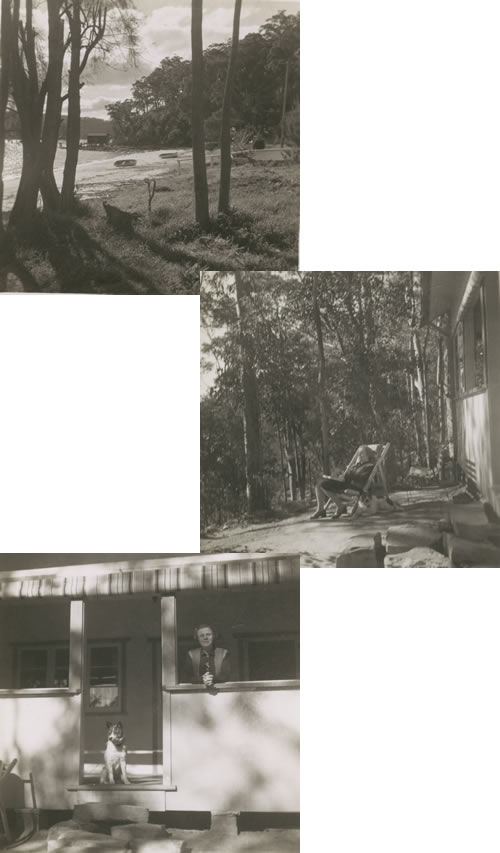
When all was quiet at night, the lapping of the little waves in Pittwater could be heard as well as koalas in the surrounding trees, which had a call like crying babies. During the day I helped Uncle Perce and Betty collect cunje from the rocks to use as bait when we went fishing in the launch. Auntie Dorrie, organised a picnic lunch which we ate on an island in Pittwater. She was a very energetic and organised woman who would have coped with six children, with only one she tended to be dominant. Mum could not do much to help. She was expected to rest and recuperate, so she sat in a comfortable spot and read or sewed or mended or did embroidery.
"Next time we'll take you to Palm Beach and the Barrenjoey lighthouse. But before then we'll have to get you a swimming costume."
I had learnt to avoid getting sunburnt at the beach, it was too painful, but I thought if I tried I could tan like most of my friends. But it always followed a set pattern of redness, peeling and more freckles. By now I had learnt to avoid the blister stage.
* * *
As the weather warmed, we were allowed to attend school in navy-blue dresses with white collars and white socks, instead of tunics and black stockings. Betty bought a pattern and made me a suitable dress using her mother's sewing-machine, turned by hand.
Betty also took me one day to Open Day at the University where I was particularly interested in the displays of preserved organs and foetuses in large jars which Betty could explain, having studied anatomy. She also took me to a display at the town hall where Jack Davey, a popular entertainer was featured. I had the experience of having my voice recorded and hearing it played back.
I had often complained of backaches after a fall as a small child, falling down the steps at Erskineville station and again recently after I had hurt my tail bone on the hinge of my seat at school. Mum thought I had "growing pains". Betty advised me to sit up straight and not slouch. When I tried, my back soon got tired and ached. Miss Cohen said we should not carry heavy cases to and from Wynyard Station. We all had lockers in which to leave our books, but it was not always easy to organise which books we would need as we rushed to catch our trains or trams.
At the end of the year I came 14th out of 133 in my year which pleased everybody. In second year I could elect to study German or Latin. If I had not done well in French, I would not have been able to do a second language, but would have done biology, sewing, art or music. 2A would do Latin. 2B would do German. I chose German as I thought it would be more useful if I got a chance to travel but Uncle Perce thought Latin would have been a better choice for University.
A good education at that time was considered to be the acquisition of a vast amount of knowledge imparted by the teachers and absorbed by the pupils and regurgitated upon demand. No-one expected that we would produce any really original ideas or that we would question values, certainly not think critically about anything, in spite of our school motto and the notion that learning algebra taught us logical thinking and that straight copying was taboo.
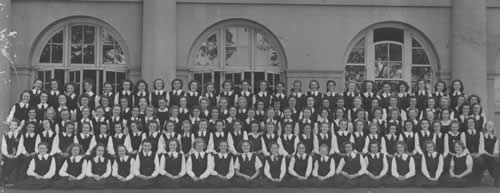
Click
here for a larger image
Our school year ended with Speech Day held at the historic building then used as the Conservatorium of Music. It was within walking distance. The girls were required to wear white frocks and I was able to borrow one. Those who could, took hydrangeas to decorate the stage, the staff wore their academic gowns and mortar boards. There were speeches about our achievements and singing. Those girls who had come top in each subject got prizes. The rest of us listened and applauded politely.
It was not possible for us all to stay indefinitely in that little house at Artarmon. Mum was determined to get her own place and the family would not hear of the only thing available "room with use of conveniences" in the homes of strangers. So it was proposed to the Housing Commission to build a small detached room in the flat back yard of Auntie Ida's at Ramsgate. Of her siblings Auntie Ida was the closest in many ways to Mum and was not a dominating person, so Mum agreed. I knew Ramsgate well, having often gone there to visit from Bankstown and later from Cammeray. My cousins were there and several friends. The two-bedroom cottage, built for my grandparents in 1914 and named "Koppin Yarratt", was already grossly overcrowded. My aunt and uncle,Ida and Charlie, and four children, Margaret, David, Charlie and Mary, had lived there since my grandmother died in 1936, paying rent to the rest of the family. The housing shortage was desperate. After her marriage my cousin Margaret's husband Leo was also living there.
When she got pregnant Margaret felt that the neighbours were expecting a "premature" birth as the wedding had been recent and the engagement short. They were to be disappointed. My youngest cousin, Mary slept in the living-room which also held a lounge and the piano and the boys slept on the closed-in back veranda. Margaret and Leo had applied for emergency accommodation but this would not eventuate any day soon.
Mum and I would be independent apart from the laundry/bathroom, with a fuel copper for hot water and a pan toilet in the back yard. With six adults and three children an extra pan collection would be needed each week.
When the room was finished, our furniture retrieved from storage after three or four months and I prepared with mixed feelings to move.
NEXT >>

 Uncle Percy, Aunty Dorrie and Betty
Uncle Percy, Aunty Dorrie and Betty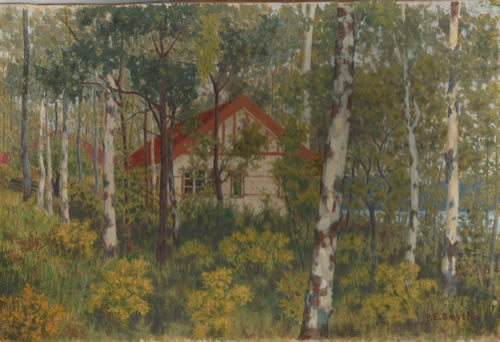

 Click
Click 